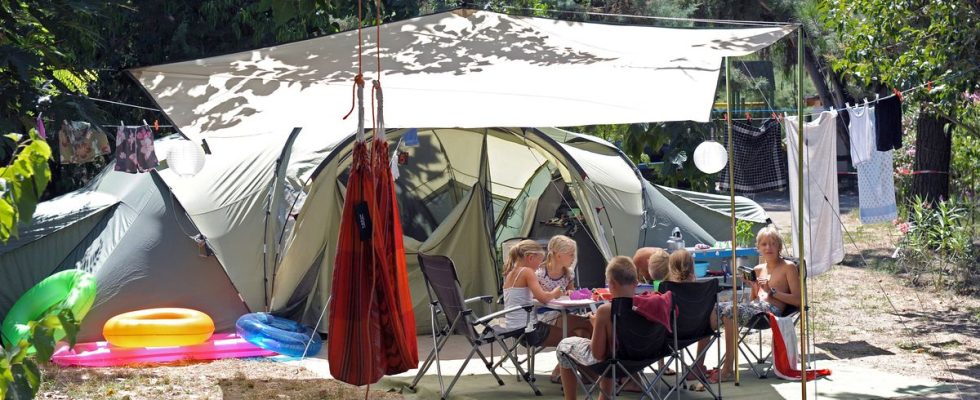It will have had the merit of launching the debate. Almost six months ago to the day, a petition appeared on the Change.org platform. With a simple question: “Is a campsite that no longer accepts campers a real campsite?” The text, signed “Save the real campsite”, a collective mixing operators and campers, has collected nearly 34,000 signatures since its launch last February. At the heart of the debate, the fear of the disappearance of bare pitches, which allow you to install a good old tent or a caravan. “No, a 100% rental establishment is no longer a campsite. We have to find criteria that are both reasonable and objective, which define what a campsite is,” suggests the plea.
So, to use Kylian Mbappé’s phrase that has gone viral and adapt it to our subject, can we really say today that “camping has changed”? sociologist of leisure, Olivier Sirost summoned his own childhood memories to answer the question. “I was born in 1968. I have childhood memories, I was less than ten years old, of camping on the island of Oléron where an uncle put his caravan on the sand facing the sea, recalls this professor at the University of Rouen. Mostly, during these years, camping was very free and wild in its way of setting up, especially on the coast. »
From a free practice to a supervised and equipped campsite
Then, the legislation comes to frame the practice, by introducing hygiene standards and a campsite labeled by the public authorities. With a tipping point: the 1980s. “At that time, more than a third of campsites were managed either by municipalities or by associations of campers. But the national outdoor hotel federation (FNHPA) will gain momentum and the mode of accommodation is changing. In 1981, a decree appeared on the creation of residential leisure parks, recalls our expert. Today, less than 8% of campsites are associative or municipal, i.e. 92% of labeled campsites in France are leisure parks, open-air hotels , it completely changed the model”.
The controversy around “real camping”, Nicolas Dayot does not understand it. The president of the FNHPA draws the figures. Yes, bare pitches have gone down in volume, no, they are not on the way out. “About 51% of camping places are bare pitches, and attendance is the same as ten years ago. We are losing pitches because we have built mobile homes, of course, but also because around a hundred campsites close their doors every year, ”recalls the manager of two campsites in Brittany.
Towards a gentrification of the practice?
Nicolas Dayot refuses to oppose equipped pitches and bare places, judging on the contrary that cohabitation suits these two types of camping. “It is complementary, because the additional turnover generated by the equipped pitches has enabled the campsite to improve its equipment, in particular those which only concern bare pitches, such as the sanitary blocks”, reminds the manager to the 4,500 members, i.e. more than 90% of the profession.
Still, this “new campsite” gives pride of place to establishments classified 3,4 and 5 stars, according to annual data published by INSEE in 2022. Last year, 3- and 4-star campsites accumulated 90 million overnight stays, compared to only 14 for facilities classified as 1 and 2 stars. “The bulk of the turnover and the longest stays are made on the top of the range, which targets the populations who have the most means”, notes Olivier Sirost.
Camping has won the image battle
“We have never welcomed so many popular customers as today”, cuts Nicolas Dayot, who hastens to illustrate his point with an example: “there is a public support system for going on vacation financed by the Family Allowance Fund (Vacaf). Nearly 80% of the funds for this aid go to campsites, particularly in Vendée, Charente-Maritime and Hérault, three departments which host very well-equipped establishments. »
Camping has evolved, but has its spirit endured? For Jean-Claude Sherer, president of the associative camping of the Blue Cross, the philosophy of camping cannot disappear. “Meals together, laughs, boules (petanque), carousing…” will always be the winning recipe for holidays. With one particularity, for him and his vacationers: no alcohol allowed in his campsite in Ardèche, which primarily welcomes ex-addicts.
After having conveyed a popular and redneck image, the campsite seems able to carry another aesthetic. “The clichés rednecks on the campsite were maintained by the cinema, then by novels and comics in the 1970s, where we see campers spraying DDT to drive away mosquitoes, recalls Olivier Sirost. But behind the clichés, the campsite advocates a return to life which takes on its full meaning today with a high ecological sensitivity of the population. »
If France is the undisputed leader of camping in Europe (it accounts for 34% of total attendance), camping there “was looked down upon with condescension” several decades ago, concedes Nicolas Dayot. The fact remains that Adac, a German guide which lists the best establishments, acclaims France. As for the president of the FNHPA, he is delighted: “Even the French rugby team spends part of the World Cup camping. We could never have imagined this a few years ago. »

